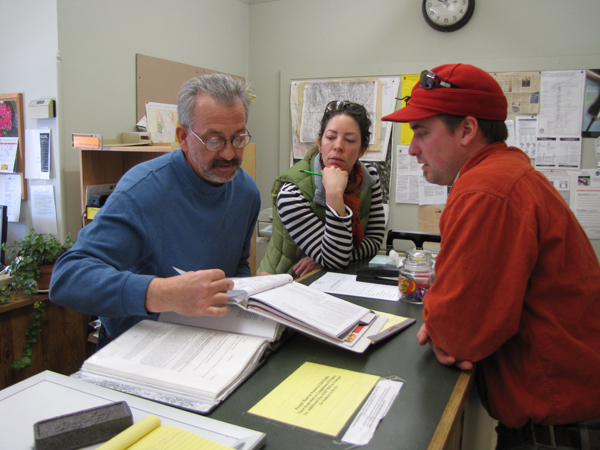A Building Inspector, A Town Manager, A Town Counsel, A Board of Selectmen & A Tree Farm That Isn’t
June 10, 2011
GREAT BARRINGTON, MA
There was a grim smile on Ed May’s face when he left the Town Hall meeting room Monday night.
“I feel vindicated,” he said quietly.
At a special Board of Selectmen meeting, Selectman Alana Chernila had declared her support — in no uncertain terms — for the town’s embattled building inspector and zoning enforcement agent.
May had been on the hot seat for issuing cease-and-desist orders to an excavating business operating in a residential zone on Blue Hill Road.
“I did not understand this issue when it first came up in the fall, and I am sorry that I did not then say, ‘yes, I support our zoning enforcement officer.’ But I’m saying it now,” Chernila declared, after listening to an hour of excuses from Town Manager Kevin O’Donnell and Town Counsel David Doneski about why the illegal business operations on Blue Hill Road had not been halted.
“I say we owe a lot of gratitude to Ed May for doing his job, and I now say, ‘yes’ we support our zoning enforcement officer enforcing zoning regulations,” Chernila stated.
After the first cease and desist order delivered in August of last year, Town Manager Kevin O’Donnell had instructed May, the town’s legally empowered zoning enforcement officer, to “observe only” the operations of excavating and trucking business. But May persisted, as complaints continued, and issue. And in December, he issued a second order.
Finally, relations between the town manager and the building inspector had become so strained that as the issue emerged as a public showdown between the integrity of the town’s zoning regulations and a backroom deal that had allowed the business to continue, O’Donnell had requested that May resign. The building inspector refused.

Great Barrington Building Inspector Ed May helps applicants with their building permit
That’s where it stood when the selectmen held a special meeting to determine why lawful cease-and-desist orders had been ignored by Gary O’Brien, the contractor and property owner.
As Selectman Deborah Phillips argued, it’s really cut and dried: the zoning officer issues a cease-and-desist order. If the property owner disagrees, the matter is referred to the Zoning Board of Appeals.
In this case, however, the town manager and town counsel intervened, in consultation with O’Brien’s attorney, Edward McCormick, a well-known figure in town who also serves as town moderator, assistant fire chief and director of emergency management response.
Instead of following protocol – appealing to the ZBA – McCormick had gone to O’Donnell. This is not a clear-cut case, McCormick maintained, because of a 1996 Superior Court case that allowed the previous property owner, Rogers Trucking, to have some greatly diminished business operations, namely, he was allowed to park a garbage truck on the property but was not allowed to run a transfer station or “transfer materials.” McCormick claimed this ruling allowed his client to operate a business.
Further, McCormick noted, whatever objectionable activity O’Brien is engaged in is due to his effort to establish a tree farm, an allowable agricultural use.
Town Counsel Doneski had yielded to McCormick’s interpretation, though he admitted that there were no transcripts of conversations. He insisted that the court judgment had muddied the waters.
Still, he conceded that he had approved the original cease-and-desist order. When asked why he now deemed the cease-and-desist order to have been unwarranted, he replied: “I won’t answer that.”
In the meantime, May was not buying it, seeing the “tree farm” as a cover to continue an expanded landscaping business that had also become a landlord to at least two other businesses. The “tree farm,” he pointed out, was situated in a gravel pit.
Besides, the Conservation Commission had weighed in, citing O’Brien for violating water course regulations due to a salt shed that was situated on the banks of a stream.
For Planning Board Chairman Jonathan Hankin, however, this issue was clearly an example of a back-room deal to avoid compliance with zoning regulations.
“This feels insidious. It seems to me this is about zoning and land use, whose regulations passed by a two-thirds majority at Town Meeting, meaning they were approved by a higher standard and are sacrosanct,” he declared. “If Kevin O’Donnell doesn’t like May’s decision, then have O’Brien go to the ZBA where he can apply for a special permit for a nonconforming use in a residential zone.”
Hankin continued: “Why is O’Donnell involved at all. He’s putting pressure on May, who has a crappy job, but is doing it very well. Sitting with the Town Manager is not the way to deal with it.”
Selectman Andrew Blechman agreed: “Rather than going to the ZBA, they went through the back channels.”
And that’s where it may remain unless the town chooses to enforce its own zoning bylaws. So far, according to May, O’Brien has accumulated $93,000 in fines.
“But,” he added: “The court, at the building inspector’s recommendation, customarily waives those fines when there is compliance.”
The selectmen, however, have adopted a new policy intended to avoid the kind of back channel negotiations that has let O’Brien continue his operations in spite of being ordered to stop – and to avoid the situation where the selectmen have been kept in the dark.
From now on, according to Board Chairman Sean Stanton, all communications between the town and its town counsel will be copied to the selectmen.
by David Scribner
